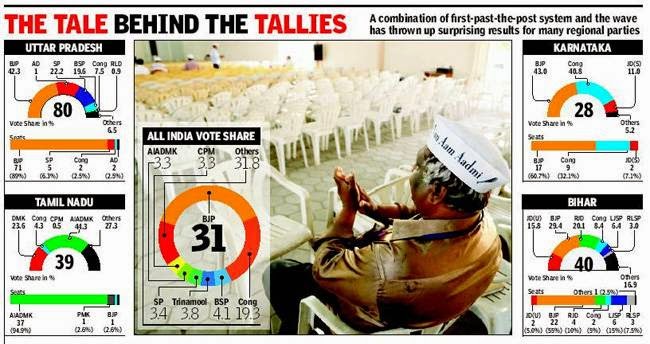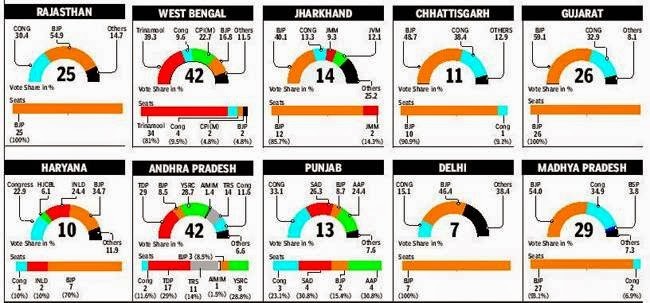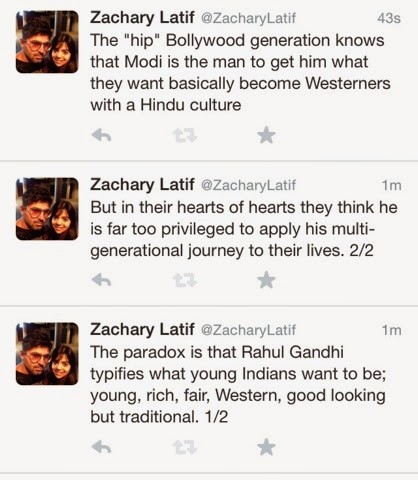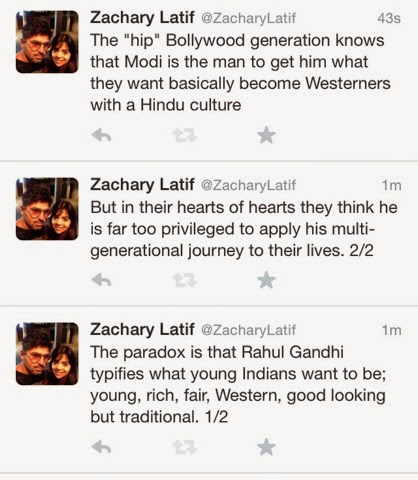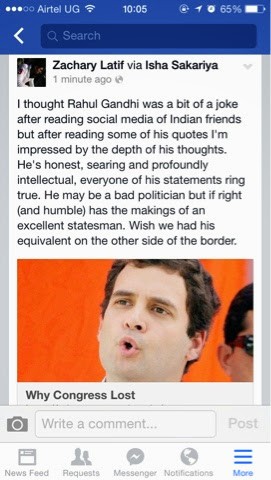What a difference an year makes. Still Tehelka should do a re-interview of the “community leaders” –
Salman Husain, Arshad Madani, Mohammed Adeeb, Zahid Ali Khan, and others – cited below to see what wonderful strategies they have cooked up to counter-act the mighty Tsu-Namo.
We hope it works better than the miserable single point action plan they had devised for this election.
BTW one side-effect of a BJP sweep has been that the only most communal minded muslim parties/individuals have won as well and will be starkly prominent in the new parliament. There is the in-famous Asaduddin Owaisi of AIMIM (Hyderabad), Sirajuddin and Badruddin Ajmal of AIUDF (Barpeta and Dhubri, Axom), and E Ahamed and ET Mohammed Bashir of IUML (Malappuram and Ponnani, Kerala).
This is what full blown polarization looks like and it has not happened in one day. We will be accused of simplifying but 2014 happened because of three massively bad judgement calls made 30 years ago by the “secular” Rajiv Gandhi.
……..
In 1985, prime minister Rajiv Gandhi gave in to the Muslim zealots in
the Shah Bano affair. Overruling a secular court’s decision that
repudiated wife Shah Bano was entitled to alimony from her ex-husband,
he enacted a law abolishing the alimony provision in conformity with the
Sharia.
Only months later, Rajiv restored the balance by giving the Hindus
something as well: he ordered the locks on the Ramjanmabhoomi-Babri
Masjid in Ayodhya removed. Until then, a priest had been permitted to
perform puja once a year for the idols installed there in 1949. Now, all
Hindus were given access to what they consider the birthplace of Rama,
the prince posthumously deified as an incarnation of Vishnu.
..
Rajiv Gandhi had a huge majority and enormous good-will behind him. Yet he went ahead and appeased (conservative) muslims by denying justice to an old, infirm widow (Shah Bano). Next, he counter-appeased the (conservative) Hindus by opening the locks of Babri Masjid. Last but not the least, there was no justice to be had for the Sikhs of Trilokpuri, Delhi and elsewhere who were murdered in broad daylight.
End result: you have a Hindu-Sikh-Jain-Buddhist alliance voting for the BJP (and a fair amount of muslims as well). Congress sinks from 415 seats in 1984 to only 44 in 2014. BJP rises from 2 seats in 1984 to 286 seats in 2014 (and 340 as an alliance). Justice in its own way has been achieved, but there have been countless number of victims on the way. Will the decent, fair-minded Rahul Gandhi have the guts to face the truth and apologize to the nation for these acts of treachery? If not, bye bye for good.
……..
India’s Muslims, goes the conventional wisdom,
are a votebank. That bank is now working aggressively towards becoming the
central bank of Indian politics with a view to dominating its future political
currency. If conversations, events and initiatives of the past four weeks are
an indicator, Muslim social and political organisations as well as prominent Muslims
have evolved a one-point agenda: to deny the Bharatiya Janata Party (BJP)
strongman Narendra Modi a shot at becoming
India’s prime minister after the 16th General Election that is due in a year.
Their tactic: defeat the BJP and its potential allies in every Lok Sabha
constituency where the Muslim vote can sway the result.
…
“Narendra Modi is the No. 1 enemy of
India’s Muslims,” says Salman Hussain, a fiery
Islamic scholar who teaches at one of India’s most influential Islamic
seminaries, the 19th-century Darul Uloom Nadwatul, at Lucknow in Uttar Pradesh.
“If Modi becomes prime minister, more Muslims
will be massacred, more mosques demolished.” While that may be rabble-rousing
at its worst, there is no denying that the anti-Modi sentiment among India’s
nearly 180 million Muslims has deepened since a cry went up
in the BJP last month to name Modi the party’s top prospect for the Lok Sabha
election.
…
“The BJP is fundamentally an anti- Muslim party and Modi proved that with
his role in the massacre of Muslims in Gujarat,”
says Arshad Madani, who leads a faction of the Jamiat Ulema-e-Hind, an
influential sociopolitical organisation of clerics. Five months after Modi
became chief minister, more than 2,000 Muslims
died in February-March 2002 in violence by Hindu zealots of the BJP-RSS after a
train fire killed 57 Hindu passengers. “Muslims
know that if the BJP comes to power, their troubles will worsen.”
…
Indeed, the chant of Modi-as-PM that shot up in decibels at an all-India
meet of the BJP in New Delhi in early March set the cat among the pigeons.
Until then, the Muslim electorate across India was widely disenchanted with
Prime Minister Manmohan Singh’s United
Progressive Alliance (UPA) for unkept promises in its nine-year-rule. They were
miffed as the UPA has failed to introduce reservations for them in jobs and
educational institutions, a pre-election promise. They were also angered by the
sudden hanging in February of Afzal Guru, a Kashmiri who had been on death row
for years after being convicted as a conspirator in the 2001 Parliament attack.
….
Muslim leaders have long slammed the Congress
for what they see as its failure to improve the Muslims’
lot after a panel led by former Delhi High Court Chief Justice Rajinder Sachar
reported in 2006 that Muslims were one of India’s most
neglected social groups in terms of education, employment, poverty and health.
But with Modi’s name to the fore, the foremost concern among Muslims
now is to stop the BJP from returning to power in New Delhi at any cost.
….
From Lucknow in the north to Hyderabad in the south and Kolkata in the east,
the dominant discourse among the Muslim community is as follows: coalition
governments that have run India unbroken since 1996 will continue as the norm.
Over the past 14 years, the BJP and the Congress
party have led two coalition governments each. Whichever of the two parties
wins more seats at the next General Election would team up with the floaters to
notch a majority and form the government.
….
Except for those political parties that are direct opponents of the Congress
in their regions and would, therefore, never join hands with it, or the
Communists who would never pair up with the Hindu sectarian BJP, all other
regional parties are capable of going either way. Hence, Muslims
should vote against the BJP, its allies and the fence-sitters who fail to
unequivocally clarify before the elections that they would have no truck with
the BJP.
…
“Wherever a party’s relationship with the BJP is suspect, it would lose the
Muslim vote,” says psephologist Yogendra Yadav, who has joined the recently
launched anti-corruption Aam Aadmi Party. Says Ilyas: “The Muslim is no more
attached to any one party. He now votes tactically to defeat the BJP and this
is how it will be in 2014.”
….
Muslim leaders reckon the community’s vote can make and unmake pretenders to
100-150 Lok Sabha seats. These seats are not to be confused with those that Muslims
win. Today, there are only 30 Muslims in the Lok Sabha, just 5.5
percent of its 543 seats. As per the 2011 Census, Muslims
are nearly 15 percent of India’s 1.2 billion people. But although Muslims
in the Lok Sabha are barely a third of their share in the population, their arc
of electoral influence is far greater. In 35 seats, they number around one in
three voters or more. In 38 other seats, Muslims
are 21-30 percent of the electorate. If the 145 seats where they are 11-20
percent are added to this, Muslim voters have the ability to influence the
outcome in a whopping 218 seats.
…
Ironically, until now, the Muslim vote has been most effective where it is
around 10 percent of the electorate, big enough to sway the result in a
multi-cornered contest by going all in for a single candidate, but too small to
raise alarm in the BJP or its allies to trigger attempts at a
counter-polarisation of non-Muslim votes. On the other hand, wherever their
numbers are 20 percent and above, Muslim votes have mostly been ineffective
because of a multiplicity of Muslim candidates divvying up their support, often
handing victory to the BJP on a platter.
…
Muslims have shortlisted Uttar Pradesh,
Bihar and West Bengal as their key battleground
states because their results would most impact who leads the next government:
the Congress or the BJP. Next in importance
for the Muslims are Andhra Pradesh, Assam,
Maharashtra and Karnataka, where the more seats in the kitty of the Congress
the less likely would be the BJP’s chances to form the government.
……..
Indeed, the
selection of the primary battleground states of Uttar Pradesh and Bihar is
based on their experience of coalition politics since 1998, when the BJP formed
its first stable national government heading a multi-party coalition with Atal
Bihari Vajpayee as prime minister. The key to the BJP’s victories in the 1998
and 1999 Lok Sabha elections lay in its wins in Uttar Pradesh and Bihar. These
back-to-back victories jolted the Muslims, who are around 20 percent in
these states’ overall population.
….
Chastened, the Muslims voted tactically in Uttar Pradesh
and Bihar in the 2004 Lok Sabha election, giving the BJP fewer seats and
bringing the UPA to power. Although the BJP did better in 2009 in Bihar due to
its alliance with Janata Dal (United), which virtually wiped out Lalu Prasad
Yadav’s Rashtriya Janata Dal, it still fared poorly in Uttar Pradesh, thanks to
the voting by Muslims there that gave the UPA a second
term.
…
Indeed, the Muslim vote has dictated the last two poll cycles in Uttar
Pradesh. In the 2007 Assembly polls, Muslims
massed behind the Bahujan Samaj Party (BSP),
giving it a clear majority, ending 15 years of unstable coalition politics. In
2012, Muslims deserted the BSP
leader, Chief Minister Mayawati, turning to the Samajwadi Party (SP) and
providing it with a majority. “Eight out of 10 Muslims
voted for the SP,” says Rajya Sabha MP Mohammad Adeeb from Uttar Pradesh, an
independent who campaigned with SP chief Mulayam Singh Yadav last
year, but now accuses him of turning his back on the Muslims.
“They won because of the Muslims.”
…
Muslims leaders say Uttar Pradesh Chief
Minister Akhilesh Yadav, the eldest son of Mulayam, has failed their community,
which comprises a whopping 40 million of the state’s nearly 200 million people.
Dozens of incidents of sectarian violence have caused a loss of Muslim life and
property across Uttar Pradesh. While the SP promised to free Muslim youths
arrested earlier for their alleged roles in terror plots, no such action has
yet been taken. The state government has also stonewalled calls to disclose the
contents of an independent inquiry it commissioned into the disputed arrests of
the youths.
….
In just two weeks in March, four public meetings focusing exclusively on
the Muslims were called at Lucknow, three of
them bringing out tens of thousands of Muslims
on the streets. While one meeting, on 2 March, was directly called by Mulayam,
he also occupied centre-stage at another rally that Arshad Madani of Jamiat
Ulema- e-Hind called on 17 March.
….
On the same day, the Congress party’s Muslim face, External
Affairs Minister Salman Khurshid, who hails from Uttar Pradesh and once headed
the party’s state unit, descended on Lucknow at a town hall sort of meeting
with Muslims, exhorting them to break free
from the SP’s grip. Earlier, on 3 March, MP Adeeb led a huge rally of Muslims
jointly with the Communists to demand that Muslims
arrested in terror cases be released. “Muslims
in Uttar Pradesh have the capacity to make and unmake national governments,” he
says. At that rally, the Muslims hooted Ashok Vajpayee, the SP
candidate from Lucknow for the 2014 polls, and refused to let him speak.
….
Of the 80 Lok Sabha constituencies in Uttar Pradesh, Muslims
number over 20 percent of the electorate in two dozen seats in west Uttar
Pradesh, including Bareilly, Badaun, Pilibhit, Rampur, Sambhal, Amroha, Meerut,
Muzaffarnagar, Saharanpur, Bijnor, Amroha and Moradabad. In east Uttar Pradesh,
Muslims
play a decisive role in at least eight seats — Azamgarh, Bahraich, Gonda,
Srawasti, Varanasi, Domariyaganj, Gonda and Balrampur.
….
In states other than Uttar Pradesh where the Muslim voters may be willing to
go against the Congress, Modi is haemorraging support
from the allies of the BJP. Bihar CM Nitish Kumar has crafted a political
miracle by fetching up Muslim votes even for the BJP because it was aligned
with him in two Assembly elections. In the 2009 Lok Sabha election, his JD(U)
won 20 of the state’s 40 seats and the BJP 12. But his aversion to Modi’s name
is now legion. Says Yogendra Yadav: “For three years, Nitish has been telling
the Muslims of his state that ‘when you vote
for me, you vote for me’.” Adds MP Adeeb: “Nitish knows that if he backs Modi,
the Muslim voters in Bihar will quickly move en masse to Lalu.”
…
Indeed, Yogendra Yadav believes that West Bengal CM Mamata Banerjee, too,
would need to clarify her position on the possibility of backing the BJP in
forming the next government at the Centre to her state’s 27 percent Muslim
population. “She will have to do something before the Lok Sabha election, which
would make her position clear vis-à-vis Modi,” he says. The Muslim voters’
disenchantment with the 34-year Communist rule contributed in no small measure
to bringing Banerjee to power in the state in 2011.
…
For the same reason, Odisha CM Naveen Patnaik, once a BJP partner, and
former Andhra Pradesh CM Chandrababu Naidu, who was a kingmaker in the BJP-led
coalition government of 1999 but has been in political wilderness since losing
power in the state in 2004, are keeping miles away from the BJP.
…
“Although the BJP has no presence in Andhra Pradesh, no party here can dare
to openly align with it now that Modi’s name has come up,” says Zahid Ali Khan
of Hyderabad, a veteran activist and editor of a leading Urdu daily newspaper,
Siyasat.
…
That, in effect, is true of virtually all political parties in the country
wherever the Muslim votes count. The sprawling residence of India’s prime
minister at New Delhi’s upscale 7, Race Course Road, may well turn out so near
and yet so far for Narendra Modi.
……..
Link: http://www.tehelka.com/the-modi-card-and-the-muslim-ace/
…….
regards
